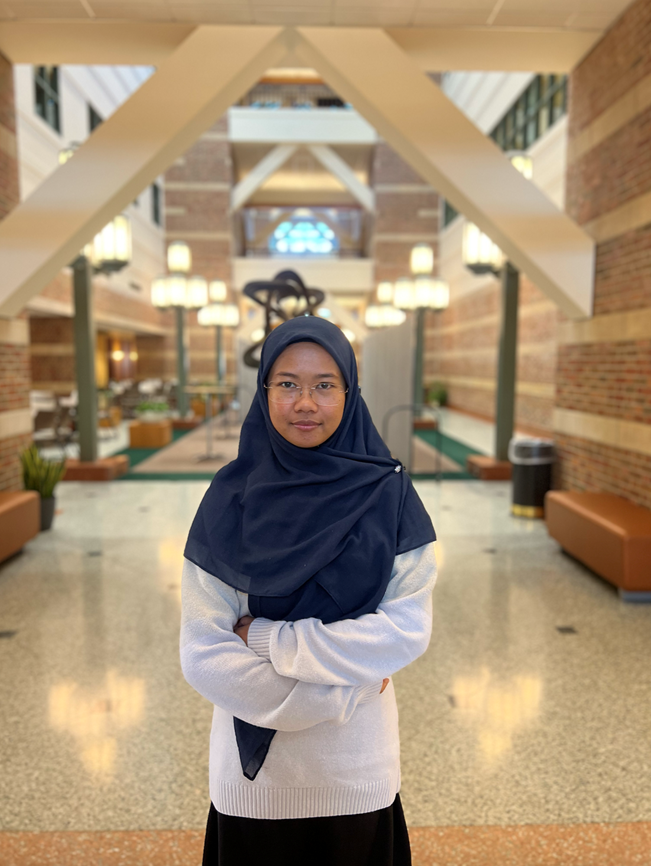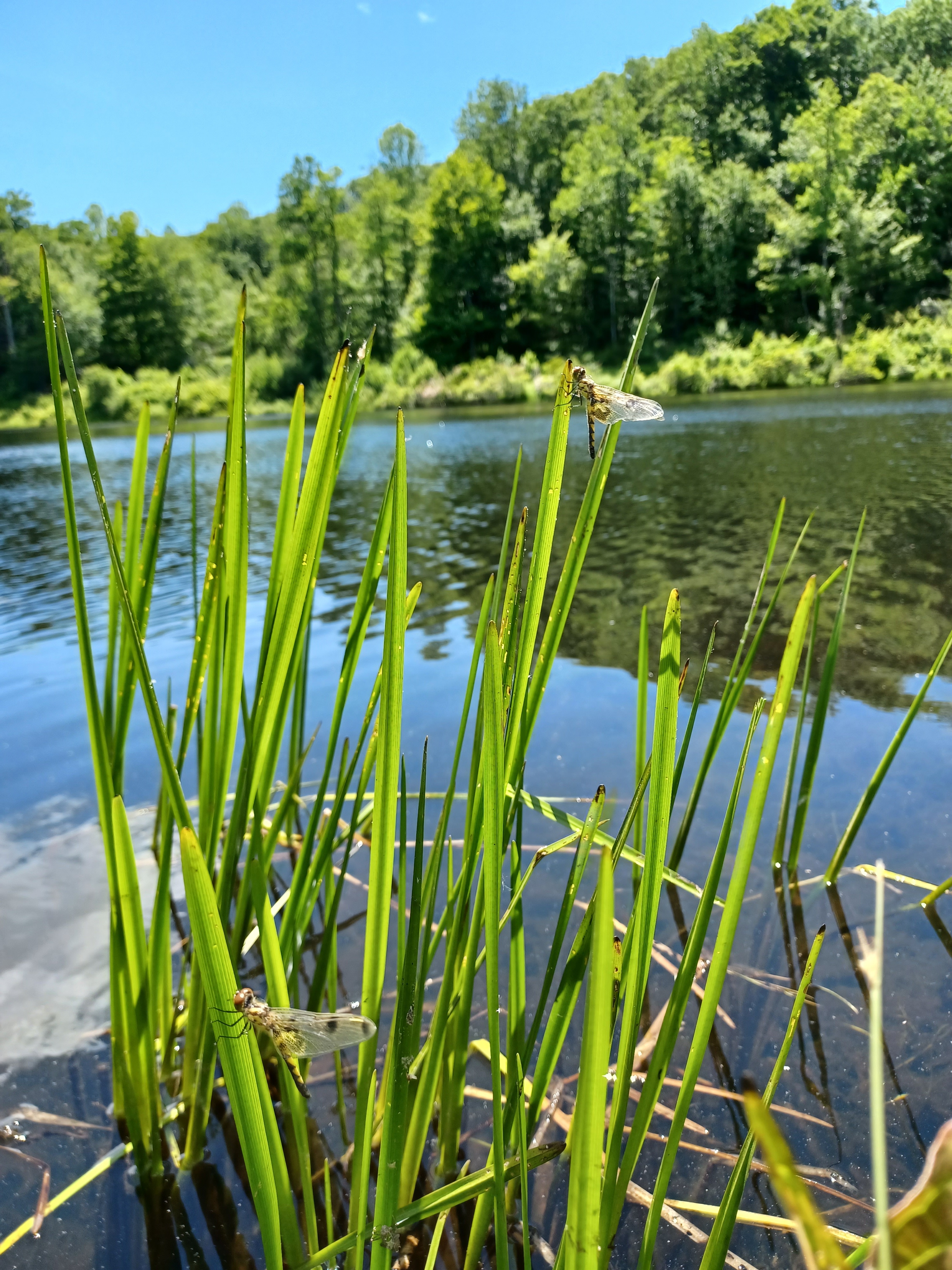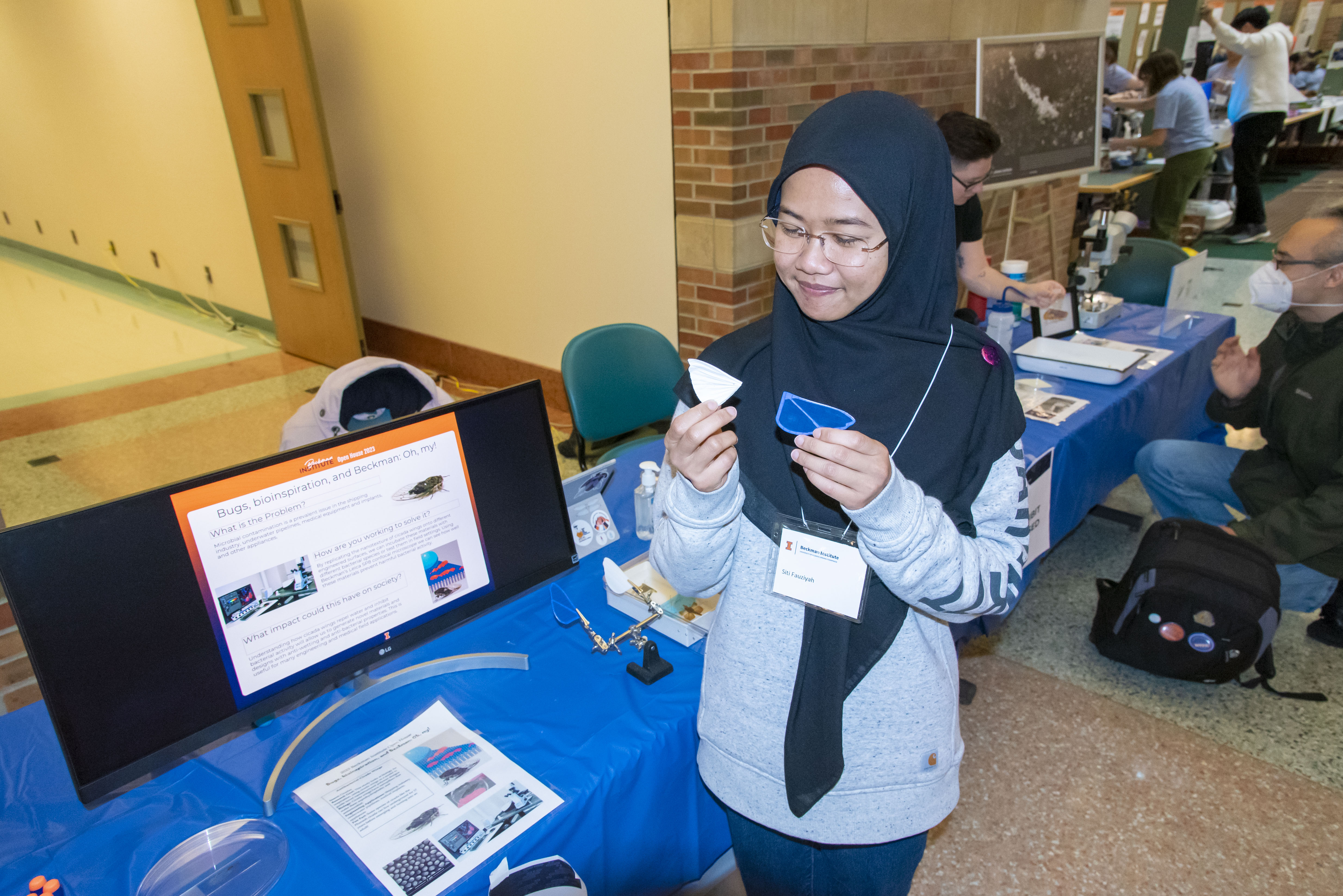Article
 Siti Fauziyah. Credit: Lily Dokhanchi, Beckman Institute Communications Office.
Siti Fauziyah. Credit: Lily Dokhanchi, Beckman Institute Communications Office.Siti Fauziyah has not stopped thinking about research since 2013. Her 10-year journey across four countries has led her to the Beckman Institute for Advanced Science and Technology to pursue her Ph.D. in entomology.
She collaborates with Marianne Alleyne, an assistant professor of entomology; Francesco Panerai, an assistant professor of aerospace engineering; and Philip Anderson, an associate professor of integrative biology.
Fauziyah studies bioinspiration, which uses knowledge of biology and engineering to study how an insect works. She researches wing composition for migratory and non-migratory dragonflies and hopes her research can eventually be used to mimic the features of dragonflies in aerial vehicles to influence their design and material use, enhancing the quality of human life.
Fauziyah attended the Gadjah Mada University in Indonesia to pursue her undergraduate degree in biology. During that time, she also began working with researchers in Finland on insect biomimetics. She then traveled to Finland to finish her undergraduate thesis on dragonfly wings.
From there, Fauziyah landed in Germany and earned her M.S. in molecular biology and evolution from Christian Albrechts Universität zu Kiel. Fauziyah then began to pursue her Ph.D in entomology at the University of Illinois Urbana-Champaign.
How did you start on this path toward becoming a researcher?
I have been interested in insect flight, especially dragonflies, since I was in my undergraduate program. I have always been curious on how they are able to fly and how their wings are so flexible. I wanted to learn if it was possible to mimic the system that they have on human technology. A friend of mine suggested I contact a biomimetic professor in Finland, and we began to work together on biomimetics while I was still in Indonesia.
During this time, one of my professors in Indonesia allowed me to use his lab for research, and he let me use the space for free. He even gave me $20 to rent equipment, and using that money, I rented a fluorescent microscope to start observing dragonfly wings. That’s how I started doing research: with just $20.
What inspired you to study dragonflies?
 Siti was inspired to study dragonflies at a young age. Credit: Siti Fauziyah.
Siti was inspired to study dragonflies at a young age. Credit: Siti Fauziyah.My study on dragonflies was inspired when I was young. It was raining heavily, and I was on my balcony with my cousin. We saw a dragonfly fly in front of us and my cousin asked me, “How is that dragonfly able to fly under the rain?” Since then, I couldn’t stop thinking about how it was able to do this and decided to research the wing system of dragonflies.
How could your research be applied in real-life scenarios and what impact do you hope it has?
I study the wing system of dragonflies: whether it is flexible, lightweight, strong, or degradable. I hope it will be possible to apply this to design buildings with less materials and to improve the quality of micro-air vehicles.
What obstacles have you faced in your research or academic career? Who or what pushed you to keep going?
What first comes to mind are the frustrations of doing research. Sometimes, we have to face multiple failures when doing research, which can be due to several factors like a lack of samples, or lack of funding, or lack of motivation.
I’ve also faced difficulties with time management; it is difficult finding a balance between working on research, studying for classes, and time for myself. I am still learning how to find this balance. I’ve also had people in the past tell me that I should not keep going in my academic career, and that was hard to hear. I decided to pursue my Ph.D. though because I did not want to let go of my ideas.
You’ve laid out the background of your research and goals you have. How does Siti fit into this?
I have goals for my research and in my studies, but I also have goals for how I use the knowledge I gain because I really love education. For me, it isn’t just about the results I find, but how I use them in teaching others and working with them. I love collaboration and hearing others’ ideas while learning from their methods. I hope to continue my contributions in the research world and allow more students to do the same in the future.
Describe a transformative moment or experience you have had at Beckman.
 Siti Fauziyah presents her exhibit at the Beckman Institute Open House in 2023. Credit: Jenna Kurtzweil, Beckman Institute Communications Office.
Siti Fauziyah presents her exhibit at the Beckman Institute Open House in 2023. Credit: Jenna Kurtzweil, Beckman Institute Communications Office.One thing that really stands out is that I’ve had the opportunity to interact with people from different backgrounds, which has been very helpful in my research. Also being granted the Beckman Institute Graduate Fellowship has allowed me to meet so many other researchers. Getting to know more people and talking with them has been such a great experience at Beckman.
What advice would you give someone who wants to become involved in research similar to yours? What advice would you give to yourself 5 years ago?
If you are in your undergraduate degree, I would say try to find your passion. That will really help you find what area of research you want to pursue. You don’t need to know exactly what you want to do, but knowing what you are passionate about will help guide you when looking into master’s and Ph.D. programs.
I would also say read as much as you can about your field. I did not do this at first, but when I began to read more, I really noticed a difference in my knowledge of my field.
Beckman’s mission is to build a better world. How does your research make the world better?
I hope to use my research in biomimetics to impact planes in the future, but I also hope to use my experiences earning my Ph.D. to become a professor. I would love to sponsor students from Indonesia to come do research in the United States like I was able to, because I think it is a great opportunity to learn.
I would love to collaborate with students while also teaching them, because I could assist them in their research while also learning more about biomimetics. This would allow me to continue working with students and be involved in their research journeys just as my professors are involved in mine.
Beckman Institute for Advanced Science and Technology